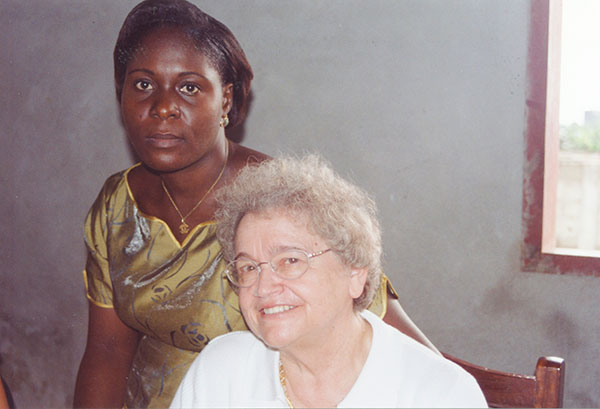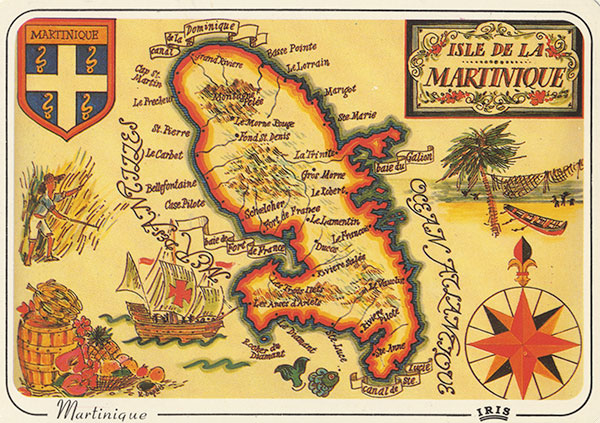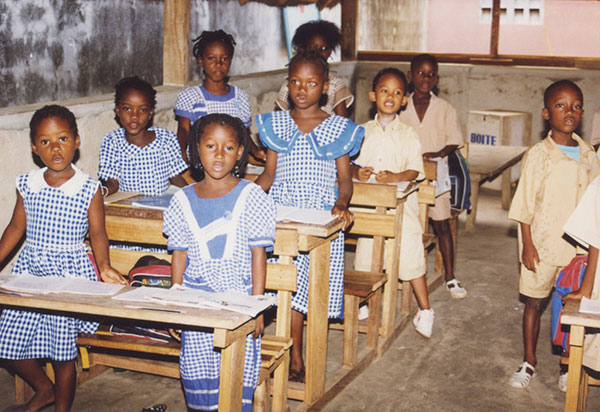
As Christians, we learn to listen to what God is saying to us, yet so often we wait for a response. What is asked of us might be difficult, but we go because we are called to act on our faith.
Brenda Gould, a resident of Pickfair Square in Pickerington, Ohio, felt the call to do mission work as a child. Her decision to take Christianity to others in the far corners of the earth — to train others to work with children, to learn their culture and live in their world — defined her for 31 years. She spent most of her working life as a missionary overseas.
In 1972, Brenda joined organized workers already in Haiti. She became immersed in an unfamiliar culture and language, learning Creole to communicate with local residents. Despite primitive conditions and being poor, she found the Haitians to be inspiring.
“You would think that Haiti would be a place of despair. The poverty was like nothing I had ever seen, but the Haitians were the greatest examples of Christ’s love. They had nothing and yet were such happy people. They lived very simply. Many had dirt floors, which were swept every day,” Brenda said.
 Working in Haiti for nearly six years helped prepare Brenda for later assignments in Martinique and Africa. The key, Brenda believed, was getting acclimated to the culture without becoming discouraged by the poverty. She was not there to change how people lived, but to offer a Christian perspective that might transform their lives.
Working in Haiti for nearly six years helped prepare Brenda for later assignments in Martinique and Africa. The key, Brenda believed, was getting acclimated to the culture without becoming discouraged by the poverty. She was not there to change how people lived, but to offer a Christian perspective that might transform their lives.
Brenda found Martinique, an island nation in the Caribbean Sea, to be surprisingly better off than Haiti, with sufficient resources to enable teenage children to wear school uniforms, have reading materials available, and even take an occasional field trip. She primarily taught others how to work with children and lead them to Christ, speaking French with, she recalls, what the Martiniquans described as a Creole accent.
While serving in Martinique, Brenda experienced an epiphany. One Sunday morning a woman approached the altar for the altar call. Having never seen an altar before, the woman did not understand its purpose.
The situation presented a cultural challenge, one demanding plenty of patience and open-mindedness. Brenda recalls thinking “you can never take anything for granted.”
 Her faith was challenged often. Diseases like dengue fever in Martinique and malaria in Africa were ever-present. Her mother passed away back home. Her father became terminally ill while she was in Martinique and she returned stateside to care for him. She returned to her assignment after mourning his death. Brenda credits her obedience to God and her faith to keep her steady when times got difficult. She prayed often and says God gave her the peace she needed to continue.
Her faith was challenged often. Diseases like dengue fever in Martinique and malaria in Africa were ever-present. Her mother passed away back home. Her father became terminally ill while she was in Martinique and she returned stateside to care for him. She returned to her assignment after mourning his death. Brenda credits her obedience to God and her faith to keep her steady when times got difficult. She prayed often and says God gave her the peace she needed to continue.
She later served for 12 years in the African nation of the Ivory Coast, which she described as a country of great contrasts — with modern high-rise buildings in cities and tiny homes in rural areas, with paved roads and dirt paths. There were more than 60 tribes, each with its own language and culture. Where Haiti had been the poorest nation, the Ivory Coast was certainly the most challenging. The tribal culture was exceptionally ethnocentric, and members of different tribes treated one another as rivals. But Brenda noticed a change when it came to church.
“After the word was out about the teachings of Christ, tribes came to the church, setting aside their tribal differences. Only God could make that happen,” Brenda said.
 The children she worked with in Africa were quiet and often malnourished, but also anxious to learn and come to Sunday school. They especially loved singing, listening to Bible stories and learning memory verses from God’s Word. Watching people she worked with come to Christ, and see them get baptized was her greatest joy during her time abroad.
The children she worked with in Africa were quiet and often malnourished, but also anxious to learn and come to Sunday school. They especially loved singing, listening to Bible stories and learning memory verses from God’s Word. Watching people she worked with come to Christ, and see them get baptized was her greatest joy during her time abroad.
There were still challenges to living in a foreign country far from home. In 1999, a downturn in the local economy caused political unrest, and the Ivory Coast experienced a coup d’ état. All things considered, the coup represented only minor changes, and quickly settled into a peaceable way of living.
In 2002, more political unrest caused the American embassy to warn people of possible evacuations. As the political landscape deteriorated, a curfew and other restrictions were imposed. Brenda and many other missionaries were evacuated, departing to neighboring Ghana on little notice in a five-passenger plane. After the evacuation, Brenda retired. Considering what she had seen while in Africa, it was difficult for Brenda to watch news coverage for any length of time.
Despite the threats posed by disease, war, rebels, homesickness and political upheaval, Brenda says she would not hesitate to return to the countries she left behind. She loved the people there that much. She trusted implicitly the word of God and His plan for her life. She understands the necessity to follow God’s plan for her life faithfully.
Brenda says of her experience, “No matter where, no matter what — God always takes care of us.”
